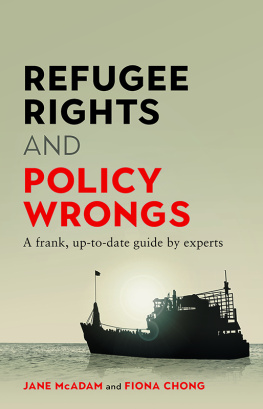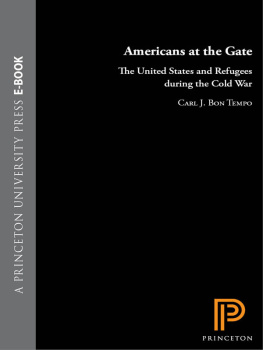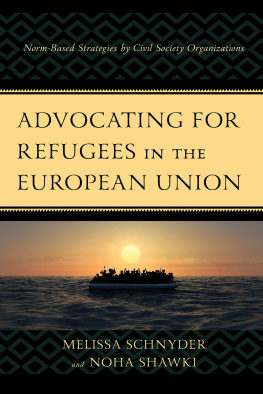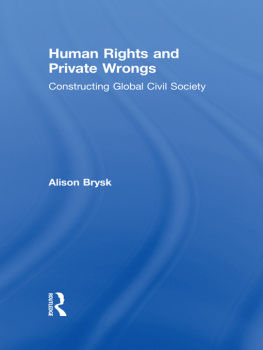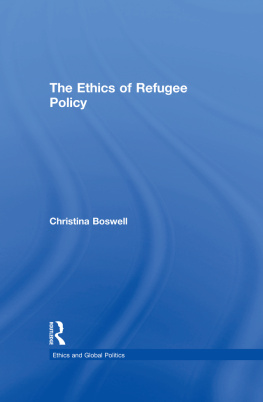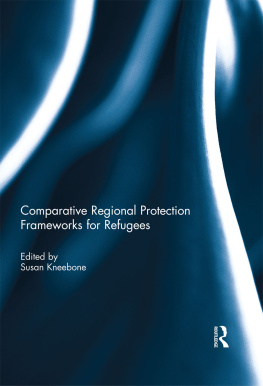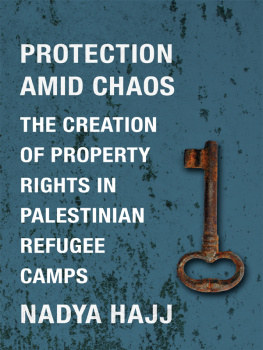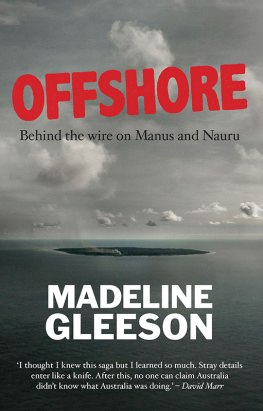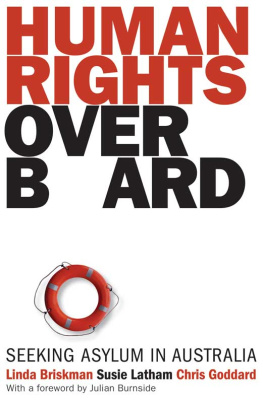

J ANE M C A DAM is Scientia Professor of Law and Director of the Andrew & Renata Kaldor Centre for International Refugee Law at the University of New South Wales. She is a Visiting Professor at Harvard Law School and at New York University; a Research Associate at Oxford Universitys Refugee Studies Centre; an Associated Senior Fellow at the Fridtjof Nansen Institute, Norway; and a Senior Research Associate of the Refugee Law Initiative, London. Jane publishes widely and is Editor-in-Chief of the International Journal of Refugee Law. In 2017, she was awarded the Calouste Gulbenkian Prize for Human Rights, becoming the first Australian recipient of the award.
F IONA C HONG is a lawyer and was recently a Human Rights Fellow in the Master of Laws program at Columbia University. She has previously worked as a lawyer at the Refugee Advice and Casework Service and as a Postgraduate Public Interest Fellow at Refugees International.
Jane and Fiona are the authors of Refugees: Why seeking asylum is legal and Australias policies are not.

A UNSW Press book
Published by
NewSouth Publishing
University of New South Wales Press Ltd
University of New South Wales
Sydney NSW 2052
AUSTRALIA newsouthpublishing.com
Jane McAdam and Fiona Chong 2019
First published 2019
This book is copyright. Apart from any fair dealing for the purpose of private study, research, criticism or review, as permitted under the Copyright Act, no part of this book may be reproduced by any process without written permission. Inquiries should be addressed to the publisher.
ISBN: 9781742236520 (paperback)
9781742244570 (ebook)
9781742249063 (ePDF)

Design Josephine Pajor-Markus
Cover design Luke Causby, Blue Cork
All reasonable efforts were taken to obtain permission to use copyright material reproduced in this book, but in some cases copyright could not be traced. The authors welcome information in this regard.
The names of some refugees and asylum seekers have been changed to protect their identity.

CONTENTS
ACKNOWLEDGMENTS
We would like to acknowledge a number of people who gave generously of their time to respond to queries and share their knowledge with us. In particular, we thank the team at the Kaldor Centre for International Refugee Law, especially Kelly Britto, Emma Dunlop, Madeline Gleeson, Guy S Goodwin-Gill, Claire Higgins, Khanh Hoang, Regina Jefferies, Lauren Martin, Sangeetha Pillai, Frances Voon, Tamara Wood and Natasha Yacoub; Tanya Jackson-Vaughan from the Refugee Advice and Casework Service; Joyce Chia and Asher Hirsch from the Refugee Council of Australia; Ben Saul from Sydney Law School; Divya Venkataraman for some assistance with style guiding; and the team at NewSouth Publishing for their encouragement and ideas, including Kathy Bail, Rosina Dimarzo, Helen Koehne, Phillipa McGuinness and Sophia Oravecz. Any errors or omissions remain, of course, our own. Finally, we would like to thank UNSW, in particular the Dean of Law, George Williams, as well as Andrew and Renata Kaldor for their ongoing support.
This book is dedicated to the memory of Peter McAdam, who saw the need for it long before we did.
ABBREVIATIONS
| AAT | Administrative Appeals Tribunal |
| ASIO | Australian Security Intelligence Organisation |
| BVE | Bridging Visa E |
| CAT | Convention against Torture |
| CRC | Convention on the Rights of the Child |
| EU | European Union |
| IAA | Immigration Assessment Authority |
| IAAAS | Immigration Advice and Application Assistance Scheme |
| ICC | International Criminal Court |
| ICCPR | International Covenant on Civil and Political Rights |
| ICESCR | International Covenant on Economic, Social and Cultural Rights |
| ICJ | International Court of Justice |
| IDC | immigration detention centre |
| MOU | Memorandum of Understanding |
| MRD | Migration and Refugee Division |
| NGO | non-governmental organisation |
| PNG | Papua New Guinea |
| RPC | regional processing centre |
| RRT | Refugee Review Tribunal |
| SHEV | Safe Haven Enterprise Visa |
| SIEV | Suspected Illegal Entry Vessel |
| SRSS | Status Resolution Support Services |
| THC | Temporary Humanitarian Concern (Visa) |
| TPV | Temporary Protection Visa |
| TSH | Temporary Safe Haven (Visa) |
| UN | United Nations |
| UNHCR | United Nations High Commissioner for Refugees |
INTRODUCTION
No one becomes a refugee by choice; but the rest of us can have a choice about how we help.
Filippo Grandi, UN High Commissioner for Refugees
A few months ago, I was talking to a taxi driver who asked me what I did for a living. When I mentioned that I was writing this book, he said, I have mixed feelings about refugees. There are too many of them coming here and theyre just a drain on our economy. I explained to him that, first, refugees represent less than 10 per cent of Australias annual immigration intake, and, secondly, the evidence shows that they are among the best-educated and most entrepreneurial members of the community. He was genuinely taken aback. Wow, Id never heard that. Ray Hadley never men-tions that stuff on 2GB radio.
That exchange encapsulates why we wrote this book and our previous book, Refugees: Why seeking asylum is legal and Australias policies are not. We were concerned that a range of problematic assumptions about refugees and asylum seekers had taken root in the Australian community, fuelled by political rhetoric and media scare campaigns. We knew that many of these assumptions were not based on evidence, and yet they were leading a growing number of ordinary Australians decent, kind and well-meaning people to support inhumane approaches to people in need of protection.
Over time, the slogans of successive governments may have changed, but the general sentiment has not. People seeking asylum by boat are now described in Australian legislation as illegal maritime arrivals even though everyone has the right to seek asylum under international law. And while we are told that the boats have stopped, there are record numbers of refugees in the world without durable solutions. At a time when international solidarity is most needed, Australia has simply pushed the problem away out of sight, out of mind.
This book provides an updated account of why many of Australias asylum policies, developed over the past three decades, are at odds with the international legal obligations that our government has voluntarily accepted. It provides a straightforward account of how international refugee law operates, and where Australias laws and policies fall short of what international law demands. It also brings facts to bear on a highly politicised debate. As Dr Munjed Al Muderis, a refugee who fled Iraq and came to Australia by boat, has observed:
Next page
